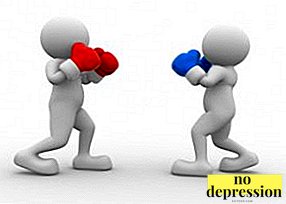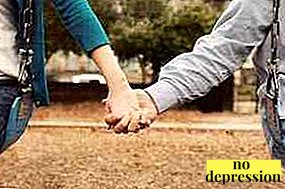Anxiety in preschool children - common problem.
To understand the causes of anxiety and eliminate them can be difficult.
Consultation with a psychologist is often necessary. But sometimes the parents themselves are able to understand their child and help him.
Anxious child - what is it?

Vitya goes to the middle group of the kindergarten. On the walk this boy often looks ordinary.
Worn as announced with other children. On the face - a smile from ear to ear. But in this state, he does not hear anything.
Here Vitya ran over the veranda, and this is forbidden territory (there are stray dogs, and they have a toilet there). The teacher once called him, the second - he was like a deaf person. Finally, she gets up, already angry, grabs the kid by the hand.
On Viti's face, an expression of serene happiness instantly, without any transition, replaced by a frightened dark mine. He pulls his head into his shoulders. And immediately it becomes clear that the boy is skinny, ungainly, somehow dull. Head down, listens to the teacher.
It is evident that the baby is very scared, although the teacher tries to speak with restraint, without raising her voice: the psychologist instructed her to not shout at this child.
Dinner. Viti has no appetite. He never is. Science has not yet established where his appetite wanders, why he never goes to kindergarten with his master. However, Vitya eating bad at hometherefore skinny and so skinny.
He sits in front of a plate, his head down, hunched over like an old man, almost buried his nose in a meat patty. If they make a remark to him, he begins, frightenedly looking at an adult, to pick open a cutlet and mashed potatoes with a spoon, but he hardly eats.
If someone offends Vitya, he begins to cry bitterly and inconsolably, as if I had just learned about the death of all my relatives. Chokes with tears, sobs, sometimes even falls to the floor and begins to roll on the floor.
 Quiet hour It is looking for someone quiet. For Viti, often the loudest for the whole day.
Quiet hour It is looking for someone quiet. For Viti, often the loudest for the whole day.
It usually begins with the fact that Victor, who was forcibly found himself in a state of physical inaction, remembers mom.
How long he had not seen mom! The whole eternity has passed! And Vitya starts crying softly into the pillow:
- Mama! I want to mom!
It is impossible to calm him down. After an hour and a half, he sometimes falls asleep, but no more than a few minutes. In a dream, he wriggles like a worm, throws off the blanket: he is always lying on the floor. Often urinates in bed. Waking up and found that again described himself, crying.
If Vitya fights with other boys, which is rarely the case: he is afraid of fights, then he waves his hands like a mill, not looking at the enemy, and begins to cry in advance. And really: he is always beaten by everyonealthough he is quite tall for his age growth.
But now, finally, the day in the kindergarten is over, and Mom came for Vitey. The same one that he still 4-5 hours ago so longed to contemplate. But Vitya stands aside, to mom does not go. Looks scared. He, as always, accomplished many feats of the day. What if the teacher already complained to mom?
How much anxiety depends on genesand why is my baby anxious? Find out from the video:
What is anxiety?
“Anxiety” refers to a constant or almost permanent abnormal internal state of a baby, the essence of which is that he is extremely unsure of himself in many ordinary situations, afraid of many things, which there is absolutely no reason to fear, periodically falls into an emotionally depressed state.
You can call such a child "permanently frightened". "Anxiety" is closely related to self-doubt, caused precisely by this personal quality of the little man. Although not every unsure child is anxious.
Anxiety is extreme, pathological form of manifestation of self-doubtclose to neurosis. Out of ten children unsure of themselves, anxious, on average, there is only one, maximum two or three children.
Symptoms and signs

Anxious children are restless. They are worried, nervous about what a healthy child of their age will make quite calmly.
Such a baby is afraid that he will be scolded for the fact that he eats badly and therefore does not eat at all.
He is afraid of fighting other children (beaten!), But he is not afraid of fighting either (dad will say again that I am wimpy). therefore generally avoids communicating with children.
Often, looking at such a child, we see that his face is tense, it is obvious that he is experiencing fear or some kind of apprehension. The mimicry of such children is poor: apart from the expression of fright, some other emotions are rarely reflected on their faces.
These children have difficulty contacting other adults and peersfor fear of a negative assessment on their part or any offense. Grievances they experience extremely violently, moreover, they can be offended by what is not clear.
They never voluntarily take on any complicated new business, they generally avoid everything new and unexpected. At the slightest failure, they simply give up what they are doing and do not want to continue.
Extremely sensitive to any criticism, even if it is very soft. Any criticisms perceive painfully, they never take them into account.
In relations with adults, they show excessive obedience, then, on the contrary, extreme self-will, that speaks of a low level of self-control: at the age of 5-6 in such children it is as in 2–3 years old.

These children often sleep badly, they see nightmares, wake up several times a night and call mother to help.
They often cry, they can sob very violently and for a long time, and, for the most insignificant reason.
Sometimes these kids experiencing and physical discomfort. So, they are characterized by recurrent abdominal pains that have no organic causes.
This is the so-called "phantom pain." The digestive organs are fine, but the child complains of pain. And he really is experiencing it.
ABOUT the psychological nature of child anxiety in this video:
How to determine the level of the method of Phillips?
Now children often go to school from 5-6 years. Kindergartens also open pre-school courses (sometimes called "schools").
Phillips technique is designed to diagnosis of school anxiety it is in a learning situation.
Phillips technique to determine the level of anxiety.
It includes various test questions with so-called "keys". The “key” is the correct answer to the question., which should give quite healthy child.

The level of anxiety is determined by the number of discrepancies between the answers of the child and the "keys".
There are 50 questions in total. If there are more than 25 discrepancies with the keys, this is clearly an alarming kid.
However, this technique designed for professionals. It is necessary to be able to interrogate children, to interpret results too.
In addition, parents do not need any surveys: they are necessary for specialists who are testing large groups of children of primary school age who are completely unfamiliar to them.
Parents without any tests and surveys will easily determine whether they are anxious or not.
How to reduce the rate?
Increased anxiety, as noted above, is caused by self-doubt, and self-doubt - this is personality quality. So, to significantly reduce the level of anxiety is not easy.
First of all, you need to determine what is wrong with the child, what is the cause of his painful condition, and eliminate it. Often parents have to reconsider something in themselves: change their attitudes towards the child, the style of communication with him.
For example, the boy Viti, an extremely anxious kid, who was described above, is very nervous, unsure of himself, poorly controlling his emotions and, besides, also a drinking father who often beats his son. This dad is also extremely and extremely demanding. Hence the anxiety of the baby.
 It is clear that it is the father who needs to change, then the son will change. And no other way this can be achieved.
It is clear that it is the father who needs to change, then the son will change. And no other way this can be achieved.
If the anxiety of the child is on the verge of neurosis (he constantly sleeps badly, refuses contact with people, very often cries, constantly eats poorly, experiences phantom pains), he should be treated by a psychiatrist.
What are the reasons?
It is impossible to name all the possible reasons: there are a lot of them. Let's call the main ones:
- The child is emotionally dysfunctional, receives less warmth from mom and dad. This may be due to the emotional distress of the fathers and mothers themselves (say, their relationship is deadlocked, they are painfully worried, are preparing for a divorce, or have already divorced).
- Baby often close adults rate negative, impose unreasonable demands on him, react hard to his failures, punish him very strictly, demand unquestioning obedience always and in everything, give no freedom.
- Parents love the baby and each other, but often and violently quarrel, and the baby sometimes becomes a witness to such quarrels.
- Parents (mothers are more inclined to this)that is, they vigorously take care of the little one, blow off dust particles from it, humor it in every way, but the child grows in the hothouse atmosphere and, oddly enough, not liked. This behavior of the mother often suggests that she really does not love her child and even feels the hostility hidden from her (for example, due to the fact that this baby was born from a man who left the woman). Therefore, she is trying hard to convince herself that she loves her child very much. This is a kind of self-hypnosis.
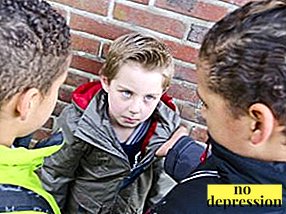 The child has experienced or continues to experience physical or / and psychological abuse above oneself.
The child has experienced or continues to experience physical or / and psychological abuse above oneself.- The child, being in the company of peers (in kindergarten), constantly experiencing communication failure, he is unpopular with other children, they are mocked at him, he is neglected, he is poisoned and constantly hurt.
- Child do not like adultswith whom he constantly has to deal with (kindergarten teachers). The kid seems to them bad, bully, disorganizer.
- The child is faced with constant failures in the learning situation, teachers consider him to be incapable, and children are teased by a "little fool."
They look at him unkindly, point out to him to other children as a negative example, often isolate him from other children.
What to do?
First of all, do not panic. The problem is solved. If a child is anxious, it does not mean that his parents should get this disease from him.
You need to understand the baby determine perhaps more precisely what the roots of his illness. And then gradually change the relationship with him, his lifestyle, something to teach.
The main methods of correction and removal of anxiety disorders in preschoolers and younger students are as follows:
- Pay more attention to the child, to communicate with him more often, to smile at him, to praise, but without pampering and over-trust.
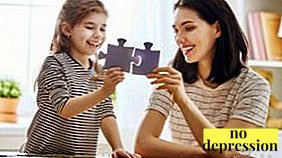 Do not do for the child what he can do himself, but always be near and help, encourage, inspiring confidence when he faces even the slightest difficulty.
Do not do for the child what he can do himself, but always be near and help, encourage, inspiring confidence when he faces even the slightest difficulty.- To instil in the child that he is normal, he is confident and strong, not only in words, but also in his attitude to him.
- Never scream at baby, not to beat him, not to criticize his personality, not to compare with other children in an unfavorable sense for him, not to demand what he finds difficult to do, but not to abandon the requirements completely.
- Allow your baby to do some businesspsychotherapeutically influencing him: to dig for hours in the sand, play and feed a puppy or kitten, talk for hours to a teddy bear.
- Eliminate as much as possible stressful factors: quarrels in the family, eg.
How to relieve anxiety in children? Consultation Israeli psychotherapist:
Prevention
First of all, harmonious family relationships are important.
If love, friendship, cooperation, mutual understanding reign in it, then the child growing up in such a family is unlikely to become anxious, and if something provokes a painful condition, it will be easily overcome.
In relations with the child should follow this line of conduct:
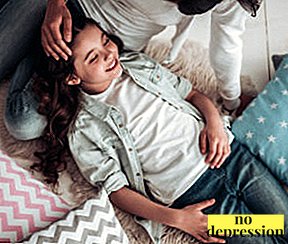 never don't compare it with other kids, but only with him, as he was yesterday and should be tomorrow;
never don't compare it with other kids, but only with him, as he was yesterday and should be tomorrow;- do not make excessive demands (always and in everything to obey, it is always great to learn), but also not to refuse any demands: to demand, but what the kid is able to do;
- give the child enough freedom and independence within reasonable limits: something he must decide himself, and not adults for him; with some difficulties to cope himself, and not his mother for him.
Anxiety in children - the result of trouble in the life and development of the child. Effectively eliminate the painful condition can only be eliminated this trouble, making the baby's life harmonious and happy.
How to help an anxious child? Psychologist tips:

 The child has experienced or continues to experience physical or / and psychological abuse above oneself.
The child has experienced or continues to experience physical or / and psychological abuse above oneself. Do not do for the child what he can do himself, but always be near and help, encourage, inspiring confidence when he faces even the slightest difficulty.
Do not do for the child what he can do himself, but always be near and help, encourage, inspiring confidence when he faces even the slightest difficulty. never don't compare it with other kids, but only with him, as he was yesterday and should be tomorrow;
never don't compare it with other kids, but only with him, as he was yesterday and should be tomorrow;
